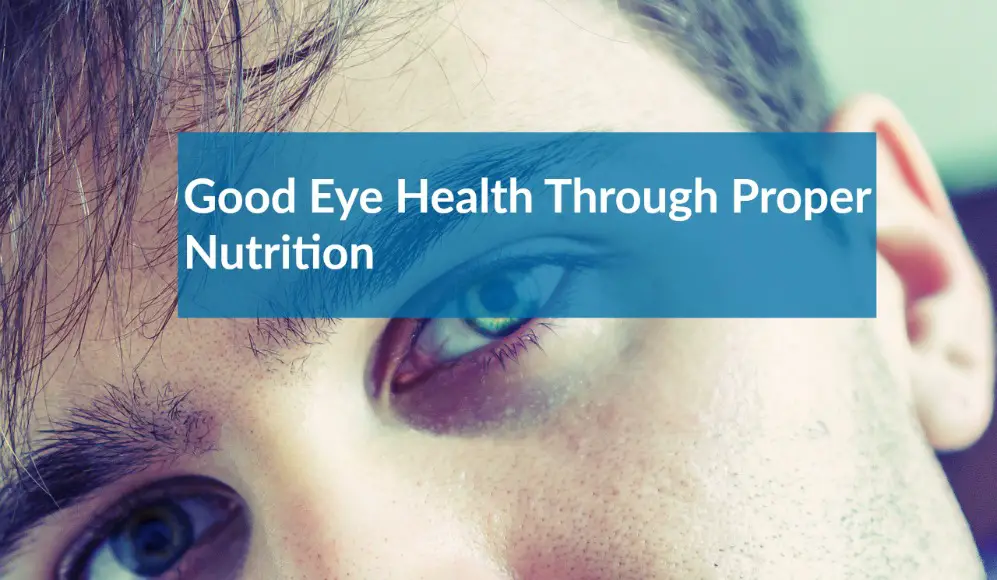Having good eyesight is critical for getting the most out of life.
Proper nutrition can help protect your eyesight by preventing some eye diseases.
Once you understand which nutrients can help you maintain good eye health, you can adjust your diet to include foods rich in those nutrients.
Here are the main nutrients you should be focussing on, as well as the foods that contain them.
Rating | Product | Our Rating | Price on Amazon |
|---|---|---|---|
#1 | |||
#2 | |||
#3 | |||
#4 | |||
#5 |
Essential Fatty Acids (Omega-3)
Researchers suggest Omega-3 fatty acids can play a role in protecting the eye against diseases that promote proliferative retinopathies (growth in blood vessels in the eyes) (Nei.nih.gov, 2014).(1)
Diabetes is one such disease, capable of causing abnormal blood vessel growth and blindness.
Two of the omega-3 fatty acids, eicosapentaenoic acid (EPA) and docosahexaenoic acid (DHA) can prevent proliferative retinopathies in the eye.
Omega-3s are crucial for the development of healthy eyes in infants (Gary Heiting, 2014).(2) Studies have shown that these fatty acids improve the vision of infants substantially.
Essential fatty acids also play a role in reducing the risk of macular degeneration.
A 2008 European study found that people who ate oily fish (loaded with Omega-3s) at least once per week had a lower risk of developing the disease (Augood et al., 2008).(3)
Omega-3 fatty acids are found in a variety of oily fish, vegetable oils, avocados and some nuts.
Lutein & Zeaxanthin
The antioxidants Lutein and Zeaxanthin are particularly beneficial in helping to maintain eye health.
Both of these antioxidants are found in the components of the eye, including the retina and macula.
Research suggests that these two antioxidants protect the eye from harmful ultraviolet rays in sunlight (Nih.gov, 2014).(4)
By increasing your levels of lutein and zeaxanthin, you can safeguard your eyes from sun damage and reduce your risk of cataracts by 50%.
The antioxidants reduce cataract risk by neutralizing free radicals that cause oxidative stress in your eyes.
The American Optometric Association (AOA) suggests that these antioxidants can slow the progress of age-related macular degeneration (Aoa.org, 2014).(5)
In general terms, dark leafy green vegetables will be the best sources of luetin, zeaxanthin and vitamin E. Kale, spinach and broccoli are the best foods for adding luetin and zeaxanthin to your diet.
Other useful foods include mango, bilberries, oranges, tangerines, eggs and sweet peppers.
Vitamin A, Vitamin C and Vitamin E
Vitamins A, C and E are all antioxidants with the ability to protect the health of your eyes.
They do this by safeguarding the eye against environmental hazards including smoke, ultraviolet light and pollution.
Having a sufficient amount of these vitamins will protect your eyes against eye diseases including macular degeneration, cataracts and xerophthalmia.
Xerophthalmia is a common eye disease in developed countries, due to the poor nutrition.
Vitamin C is the strongest antioxidant of the three and is easily replenished by eating more citrus fruit, Brussels sprouts, green peppers, strawberries and papaya.
Nuts and seeds are one of the richest sources of Vitamin E. Eat pecans, almonds, sunflower seeds and macadamias for a quick vitamin E boost.
Other foods extremely rich in vitamin E including tofu, spinach, avocados, broccoli, fish, olive oil and pumpkin.
Vitamin A is the easiest vitamin to obtain. Carrots are loaded with vitamin A and a single medium-sized carrot can provide 200% of your recommended daily intake (Bembu, 2013).(6)
Other fruits and vegetables loaded with vitamin A include sweet potatoes, red peppers, mangoes, milk, kale, cantaloupe, peas and meat.
Zinc
Zinc is a crucial nutrient for maintaining eye health. It is found in high concentrations within the eye and helps form the melanin pigment that protects the eye.
People deficient in zinc will have poor night vision and will be more likely to develop cataracts.
It is also one of the best supplements to ward off age-related macular degeneration.
A study on aged related eye diseases found that taking 40-80 mg/day zinc per day, in conjunction with the other vitamins mentioned here, can lower risk of macular degeneration by 25% (Web.emmes.com, 2014).(7)
Zinc can be found in meat and dairy products.
Conclusion
It is very simple to include these nutrients in your diet and protect your eyesight.
By addressing any deficiencies right now, you will ensure you have fantastic eyesight throughout your life.
References
(1) Nei.nih.gov,. (2014). Researchers Learn How Certain Omega-3 Fatty Acids May Halt Vision-Robbing Blood Vessel Growth in the Retina | National Eye Institute. Retrieved 10 December 2014, from nei.nih.gov/news/scienceadvances/advances/omega
(2) Gary Heiting, O. (2014). Measuring Eye Contact Helps Predict Autism in Babies. All About Vision. Retrieved 10 December 2014, from allaboutvision.com/parents/infants.htm
(3) Augood, C., Chakravarthy, U., Young, I., Vioque, J., Jong, P., & Bentham, G. et al. (2008). Oily fish consumption, dietary docosahexaenoic acid and eicosapentaenoic acid intakes, and associations with neovascular age-related macular degeneration. The American Journal Of Clinical Nutrition, 88(2), 398-406. Retrieved from ajcn.nutrition.org/content/88/2/398.abstract
(4) Nih.gov,. (2014). NIH study provides clarity on supplements for protection against blinding eye disease. Retrieved 10 December 2014, from nih.gov/news/health/may2013/nei-05.htm
(5) Aoa.org,. (2014). Lutein & Zeaxanthin. Retrieved 10 December 2014, from aoa.org/patients-and-public/caring-for-your-vision/lutein?sso=y
(6) Bembu,. (2013). 26 Foods High in Vitamin A for Healthy Eyes. Retrieved 10 December 2014, from bembu.com/vitamin-a-foods
(7) Web.emmes.com,. (2014). AREDS Home Page. Retrieved 10 December 2014, from web.emmes.com/study/areds/
Leave Feedback: Was this article helpful?

